The game has been hit by COVID and has not recovered as well as people would like.
It is too long gone and many people have gone or are not as interested as they once were. Confusion feeds complacency and disinterest in anything let alone sport.
No contests, no games, no crowds, no atmosphere. It was a competition that was up in the air for ages after South Africa pulled the plug.
There was the completely unnecessary nonsense of one team getting a bye each week and the equally ridiculous nonsense of All Blacks players and others having to be rested left, right and centre.
And last but not least, the stupidity of some of the laws coupled with referees allowing too much flexibility on the field.
Let’s first look at the laws of the game or lack thereof in some cases. The amount of time wasted in rugby union is now becoming completely farcical and turning fans away.
1. The farcical, destructive force of red and yellow cards
Red and yellow cards are now completely a blight on the game. Fans come to see a genuine contest not a destroyed contest.
Fans pay now to watch the games live – that is, if you want to view it without TV commercials and slightly delayed coverage so they can squeeze them all in, plus heavy charges to go to the game if you want decent seats plus travel. World Rugby, please wake up!
The teams, the contest, and the fans should not have to tolerate the destruction of the game through red and yellow cards.
And it is not just about the player being sent off the field but the tiring, mind-numbing TMO reviews of the incidents from five different camera angles slowed down, then the freeze frame on contact, which is now an insult to fans and just total BS.
Sadly, rugby referees have increasingly become like cricket umpires that seem to live in fear of getting it wrong. It’s not their fault, this is how much pressure the threat of social media backlash puts on them, and the pressure the entire lengthy decision process has put on refs.
It is ridiculous. Players are now expected to remember the rule book in the heat of the on-field battle with adrenalin pumping, needing to defend desperately, and in literally milliseconds at contact, change what they are going to do and adjust when a player dips, ducks, changes direction slightly, or changes body position.
The fact that this is deemed a mitigating circumstance to avoid a red card being issued is like stating the bleeding obvious, but it is also the case 95 per cent of the time.
It is an unrealistic expectation to expect players to always get that right and then have officialdom destroy the contest because of it.
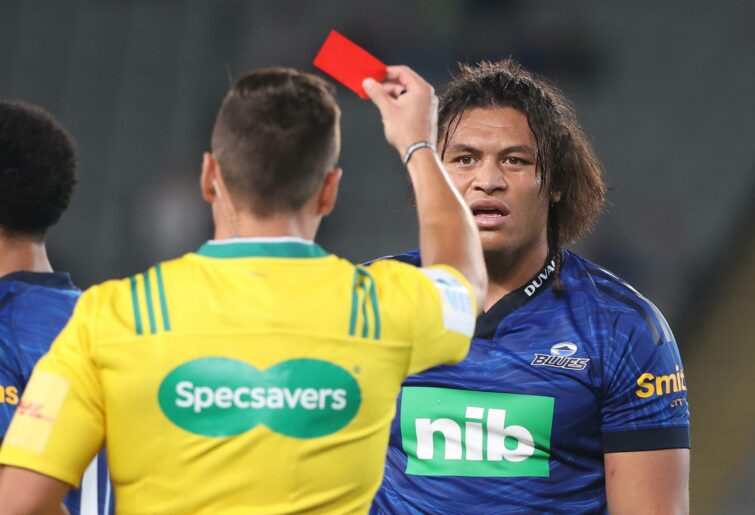
(Photo by Fiona Goodall/Getty Images)
Suggestions
A. Yellow and red cards both on report. In the yellow card case, there should be no TMO process at all as this can be done at a hearing post game.
Red cards are off, only for outrageous and egregious offences like punching someone out cold, deliberate headbutting or a genuinely completely reckless tackle in the air that the player could have genuinely pulled out of and maybe a completely reckless late charge into a ruck, which was not necessary and causes head contact.
The player is red carded but can be replaced.
This way, the contest and the spectacle for fans is not ruined by the actions of one player, which is totally unjust as his team, everyone at home and the game pays for his stupidity.
It is far more just that only that player is punished and will lose games if found guilty. Surely, they are the only one who should suffer for their individual offence?
This also would not ruin the contest of the World Cup and other major competitions.
If we must – and mean must – then let the red-carded player be replaced in ten minutes not 20 as is the case now. But I personally do not think we must do this.
B. TMO reviews for reds and the decision-making process has to be sped up.
Quickly pick the two best camera angles and only the TMO and the on-field ref make the final call, not the assistant referees.
And make the decision quickly. I mean seriously, it’s not the damn meeting of the tribunal on the field.
But again, it’s that fear of being individually blamed if you get it wrong, but that fear will be significantly reduced if the player sent off can be immediately replaced. This process also takes pressure off refs.
2. The mark is archaic and should have been dumped long ago
The mark is ruining attacking play and wasting better game time. It is ridiculous to the point of being contemptible in the modern game that simply being able to catch the ball inside your 22 allows the complete stoppage of any attacking play and the advantage immediately transferred to the defending team.
It once had to be taken a certain way to even be called a mark. Now, anything goes. A simple three-metre miss kick by a nine can be marked and play stopped – time wasted.
The ball is kicked out on the full as it is in the 22, and the lineout taken, meaning you guessed it – more time is wasted ambling there and then setting the lineout.
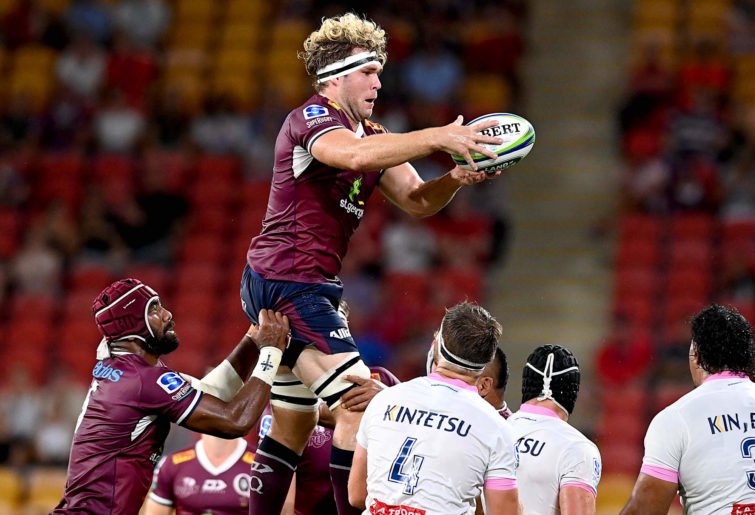
(Photo by Bradley Kanaris/Getty Images)
Suggestions
A. Get rid of the bleeding mark as it is an archaic amateur law. We now have 50/20 to help defending sides and the mark continues to ruin attacking flow way too easily.
It should not be that easy anymore to shut down attacking play – it is now a farce. If we genuinely want to see more attacking play, getting rid of the mark would be a big step forward.
3. The endless rolling maul play
The rolling maul has all the cards in its favour. As we know, it becomes a legal offside for the players in front of the ball, and the less talked about legal obstruction is heavily preventing the defence from getting to the player with the ball.
They are both elements weighted disproportionately in favour the attacking side.
The rolling maul is more and more being used as weapon from anywhere on the park, which was very noticeable in the weekend even from Kiwi sides.
A penalty often ensues from an infringement defending it in midfield. The ball is often kicked into touch – a lineout near the line – and yet another rolling maul or a scrum that keeps resetting.
The rolling maul is fine in itself, but it is being allowed to be used too often in too many areas of the park to the detriment of running rugby and as a way of simply milking endless time-wasting penalties.
Suggestions
A. The rolling maul should only get one stop before the nine has to pass the ball.
If it is stopped in motion, it is no longer a rolling maul – no more two bites at the cherry as the D has done its bloody job, or stopped it rolling.
It has enough unbalanced advantage in favour of the attacking side without getting two bites at the cherry as well.
The defending side has just half knackered itself in successfully stopping it and after this is almost always when the infringements occur. How many bleeding advantages should the rolling maul be allowed to have?
B. It should be a contest between the two packs only.
I mean how many never-ending advantages does the rolling maul get for the attacking side?
Is it any wonder it is now a go-to card for many sides? It is ridiculous that the attacking side can add backs into the maul off a set piece near the line, making it almost impossible to defend without injury or committing an offence when the defensive side clearly cannot add several backs without risking the wider channels.
C. Rolling mauls (for sake of game) can only be made inside the 22, not outside it.
Before you gripe, that is 44 metres of the field it can occur in. That’s a lot of the field.
4. Mindless, never-ending, time-wasting scrum resets
The scrums’ continued time wasting with endless repetition over petty technicalities has become insulting for those who pay to view the game at home or at the ground.
Suggestions
A. The scrum can only be reset once (that is two scrums in total), after that, a free kick is given to the side putting in the feed with no option to take yet another scrum.
It’s tap and go or a bomb. Two or three minutes – sometimes more – is often wasted just setting two scrums back-to-back. So enough already!
B. A scrum penalty must be kicked for touch or tapped unless inside the 22 where a scrum can be called by the attacking captain.
C. If the ball is at the back of the scrum, play the damn ball. Seriously, who give a rat’s rear end if the front rows have gone down – unless someone is injured.
If the ball is there to be played, allow it to be played for the sake of the game and time. Stop resetting it because of some technicality that only diehards and scrum bunnies in the audience give a stuff about while the rest are still trying to figure out why it simply was not played out the back.
The scrum is a great contest – the way it is adjudicated now is not!
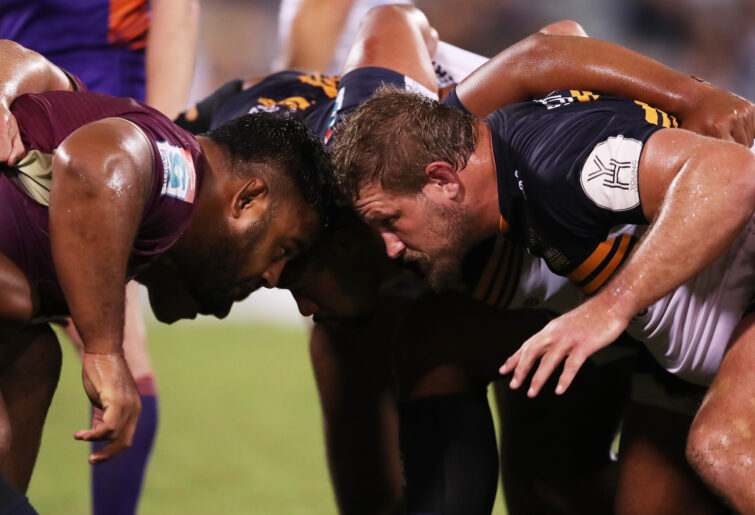
(Photo by Matt King/Getty Images)
5. ‘What the?’ lineout calls
The number of times this season a lineout throw has not been straight and not been called is now just taking the micky with fans.
While it is not the only one this season, apparently you can now throw the ball to your own backs and that is called straight.
Just ask the Reds this weekend and more than one throw of similar ilk in the Crusaders and Brumbies game – from both sides.
It was completely embarrassing refereeing from both the on-field ref and the assistant. If this is now going to pass for thrown straight, watch more sides trying it on!
Yes, you might argue this contradicts my calling for more game time as it is another stoppage but equally, I am not going to support poor refereeing that advantages a side when the opposition deserves a penalty.
Demand
A. Start calling bad throws that head towards the throwing side’s backs or are visibly skewed.
There are enough not-straight throws never called every game in the interests of fewer stoppages, but it is getting stupid.
Yes, I know, it means a scrum will no doubt be called but if it only has two sets then that will help. And we do need a scrum contest in the game.
Perhaps you only get the choice of your own throw-in or a kick. But at least call them out when they are painfully obvious.
6. Set piece and deliberate time wasting
In the weekend, the Tahs were giving the 2007 England side a run for their money on slowing down the game with cynical team pow-wows before just about every other lineout and scrum and then ambling to the lineout except when it suited them.
Time wasting like this simply needs to end by stopping it its tracks. It is cynical, and sorry, but it illustrates a complete lack of caring about fans.
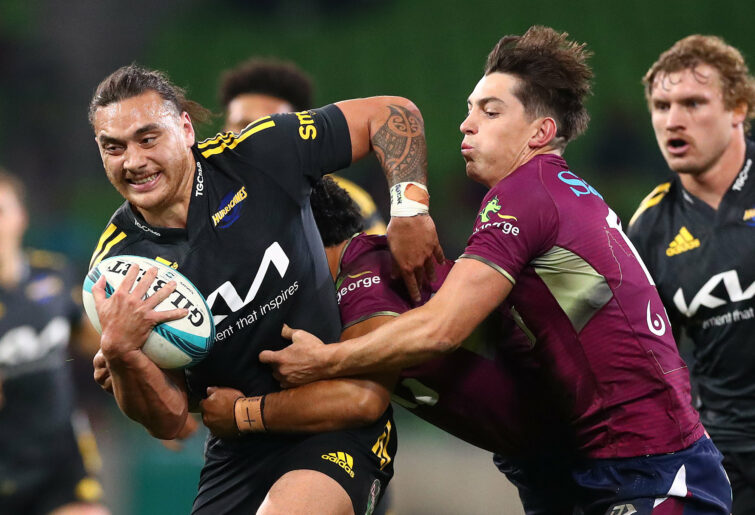
(Photo by Kelly Defina/Getty Images)
Suggestions
A. Pre scrum and lineout meetings in a huddle should be banned.
If teams do this, the captains gets one warning then if it is a repeat offence, then they are sent from the field on a blue card (captain’s card) for five minutes but another player can come on.
Same applies to deliberate ambling to scrums and lineouts. Compliance will happen very rapidly, just you bet!
The captain’s card could also be used when a captain does not stop telling the ref how to do his job after getting warned to back it up a bit. Captains need to be held accountable for this type of negative leadership.
7. Clock running down unnecessarily on conversion kicks
If five or six tries are scored (not that uncommon) in a game, kick time plus wandering back to halfway each time can cost as much as much as five to eight minutes a game – more if it is high scoring.
I mean, that is plain stupid in 2022.
We should not be paying TV broadcasters or for seats at the game for this amount of wasted time – we should be paying for genuine game time with 30 players going for it.
Penalty shots at goal are a bit different as a try has not been scored, but still.
Suggestions
A. Union should take a valuable lesson (and a long overdue one) off league and stop the clock for try conversions (once a try has been scored) with time back on when the ball is kicked at halfway.
This is much fairer on fans who want to see more game time between 30 players than have the clock count down.
League has this one dead right, and they obviously care more about their fans getting to watch more game time.
8. Waiting endlessly for TMO decisions and stopping the game unnecessarily
How many damn camera angles do you need to decide, before hello, you find the right one and best one?
How many times do you need it slowed down to decide? How many times and for what reasons do you need to stop the game as a TMO for some infringement you spotted within the last five phases?
And then we wait endlessly at times for TMO decisions – they are important – but surely we can set some limits on many times you can slow down and watch footage or go back to an earlier infringement in the middle of game time and stop the play.
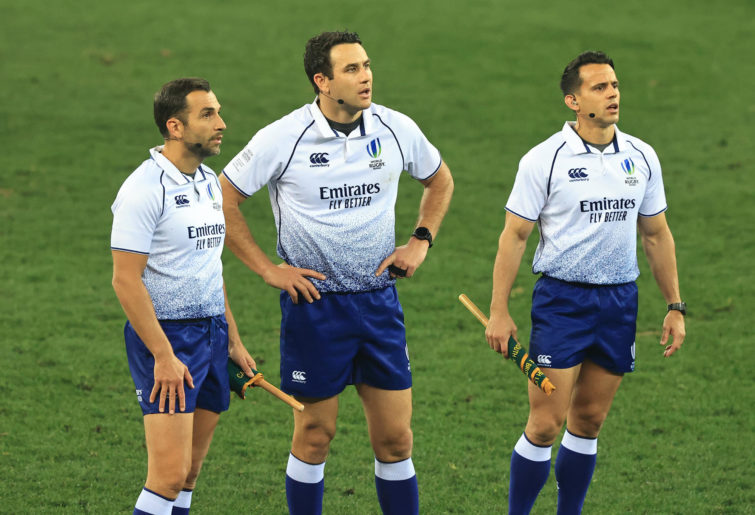
(Photo by David Rogers/Getty Images)
Suggestions
A. The TMO can only stop play and go back and review if it is very seriously reckless or cynical infringement. If a minor infringement has been missed as a fan, I am willing to let it go even if it’s against my side.
I do not want the game stopped by a TMO for missed minor infringements – play on.
B. The TMO has the right to put players on report if they feel it is warranted despite it being missed in game time.
This can be reviewed post game to get a second opinion. It could be called a post-match report. So a player is issued with a PMR. I mean, it is not like plenty is missed already – play on!
C. All infringements that occur when a try is scored that may change the ruling must be adjudicated on in game time. This is the case now of course – as it should be.
D. A strict time limit of one minute should be out on TMO decisions. Look at the footage and decide quickly. No on-field tribunal rulings – just the on-field ref and the TMO – unless it is a try decision as assistant refs are often better positioned.
9. The feigned injury insult
This prolongs injury stoppage time.
Suggestions
A. If you need physios to come out while you are lying on the ground – unless it’s a genuine very serious injury (neck, back, severe concussion) – your physios must get you to the sideline quickly and the game goes on.
Watch how quickly many suddenly recover! And watch how quickly this dribble is reduced in the game.
B. If the ref believes a player is milking it, that player should be told to get up. Get on with it immediately or get the hell off to the sideline. This does happen sometimes with better refs even now.
C. Feigning injury to get a player yellow carded should come with an immediate yellow card for the obvious blatant faker. Some Argentinian and English players like Owen Farrell deserve an Academy Award.
This is a real sickening cynical play as your objective is to get an opposition player sent off, who does not deserve it.
Note, this would be reduced, if not stopped altogether, if the players were allowed to be replaced as suggested earlier.
10. The time-wasting support staff rubbish
This is becoming insulting and farcical.
I mean, get real, teams did not need this endless support staff nonsense slowing down the game in the past. The ref cannot restart until they are off the field and many muck around deliberately if their team looks knackered.
It is now a cynical exercise used to run messages to the team during the game – it insults referees, fans, and the speed of the game.
In one game I watched at Suncorp, the same two players were getting a drink. They only had received a drink literally four minutes earlier when a conversion had been taken while the other support staff member was clearly giving instructions to the ten.
I mean, get real. Notice too how when drink support staff rush on, they often seem to go directly to certain players first just before an important play to give them a message from the coach.
What total BS that is, while the ref and the rest of us wait for them to leave the field. Though they are on time limits supposedly, that is never properly policed.
Suggestions
A. Drink and coach-message support staff are restricted to coming on once only each half. No drink stoppages every time there is a stoppage in the game including injuries.
If this is breached, they are banned from coming on for the rest of the game. They do not need to come on any more than that.
We have a thing called half time and even fairly recent past players never had constant on-field drinks breaks.
Most of the time it is message-sending BS from the coach with a couple of players having a swig of a drink. Get real, it is basically coaching during the game!
One more suggestion: after the loss of income for many after COVID, seriously reduce the ticket prices for two seasons, especially for families.
Whatever happens, something needs to happen fast. And for now anyway, stuff what the northern hemisphere thinks.

































































































